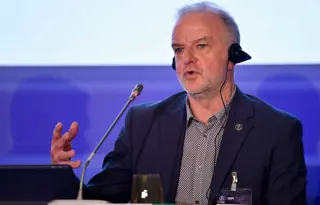News
PFA Scotland and SPFL united in calling for improved concussion management ahead of IFAB meeting

- It has now been three years since various competitions began trialling permanent substitutions in case of suspected concussions
- PFA Scotland and Scottish Professional Football League (SPFL) are among many player associations and leagues that continue to seek authorisation to trial temporary substitutions, allowing doctors enough time to assess potential concussions
- FIFPRO spoke with PFA Scotland Chief Executive Fraser Wishart ahead of the IFAB Annual General Meeting on Saturday 2 March in Glasgow, Scotland
FIFPRO, five member unions, and the World Leagues Forum with five professional football leagues have written to the International Football Association Board (IFAB) ahead of their Annual General Meeting in Glasgow, Scotland on Saturday 2 March to express their call for improved concussion management in football.
It has now been three years since various competitions began trialling permanent substitutions in case of suspected concussions. It is therefore time for IFAB to incorporate them into the Laws of the Game.
Many player associations and leagues continue to seek authorisation to trial temporary substitutions to allow doctors enough time to assess potential concussions. PFA Scotland and Professional Footballers Australia are two player associations that have recently advocated for temporary concussion substitute trials to be implemented in their respective nations. It follows similar calls from the PFA (England), UNFP (France) and MLSPA (USA).
FIFPRO caught up with PFA Scotland Chief Executive Fraser Wishart to hear why the player association is calling for improved concussion management, the importance of leagues and unions being united on the issue, and what outcome PFA Scotland hopes to see from this weekend’s IFAB meeting.
FIFPRO: Fraser, why did PFA Scotland join the call to have temporary concussion subs trialled in Scotland?
Fraser Wishart: Dementia and the link with professional football has been high on the agenda in the UK for quite some time. We helped Glasgow University’s FIELD research program, which looked into the medical records of over 7,000 former professional footballers in Scotland born between 1900 and 1976, and found that former players are more likely – 3.5 to 5 times more likely – to get dementia than normal members of the public.
From our perspective, we have a responsibility to those former players who are sadly living with dementia. But we also have to take responsibility as a game – whether it's the unions, leagues, the government bodies – for current players and future players, to minimise the chances, as much as we possibly can, of players getting dementia. We’re involved in this initiative because we do feel that temporary concussion subs are the next step forward.
#FIFPRO and @WorldLeaguesWLF have written to @TheIFAB ahead of their AGM on Saturday to call for improved concussion management.
— FIFPRO (@FIFPRO) February 29, 2024
A positive response would represent significant progress in advancing player welfare and ensuring the integrity of national-level competitions. pic.twitter.com/J09CA2cogv
How encouraging is it that the league is also on board with this?
You can only do these things in partnership; working collectively is vital. We have the SPFL, who are the clubs, also pushing for temporary substitutions, so it’s not just the union – it’s the clubs as employers taking their responsibility as well. If we’re working together collaboratively on this topic, then it can work. We welcome being able to work with the league and the clubs on this project, hopefully, if IFAB accept the extension of the pilot program.
How important is it to join an alliance of leagues and unions across the world on this issue?
IFAB is often seen as an organisation that just sits on its own, makes decisions on Laws of the Game, and makes decisions on various aspects of the playing side of the game. But it’s important that from a perspective of trying to change things, if we're lobbying together, then there's a stronger voice. It’s not just the union saying: “let's support our members”. It's not just the clubs. It's working together.
I'm hopeful we can persuade IFAB and its stakeholders to firstly incorporate the permanent substitutions into the Laws of the Game because it's still only a temporary thing and I've seen first-hand in Scotland how well that's worked. But it's also to do with the temporary concussion subs because with the British Journal of Sports Medicine saying it takes 10-15 minutes to evaluate a potential concussion, it's important for the health and safety of current players that we can minimise as much as possible the chances of them having dementia or other neurodegenerative diseases in future.

What message does it give to IFAB that this alliance is growing, and that Scotland and Australia have now joined along with England, France and USA?
It sends a strong message, and I don't think it's something that can be ignored. FIFPRO and the World Leagues Forum, representing all the unions and all the leagues across the world through the Global Labour Agreement, are united on this issue – and locally we are united with the SPFL – so it sends a very strong message to the decision-makers.
Why is it important that there is a player voice on this issue, especially when we think about this from a workplace safety perspective?
Quite often players’ voices are ignored in football governance and that's certainly the case in Scotland. We still don't have, in my opinion, meaningful consultation that leads to collective decisions on these matters. But in the end, our job as a player union is to protect and advance the interests and health and safety of our members – and this is central to that.
We are taking our position seriously and funding further research. We're involved in a research program called PREVENT with Edinburgh University, where 20 former players aged between 40 and 59, are going through rigorous cognitive testing and they will be tested every two years to see how they are doing in future. We have a duty to prevent players’ chances of getting dementia. We can only support former players who are having to live with dementia after the fact, but together we are able to help prevent players having to live with dementia in the future.
Read the full Consensus Statement on Concussion in Sport (6th version)

As Scotland’s player union, what outcome do you hope to see from this weekend’s IFAB meeting?
I think IFAB is duty-bound to send a positive message that it's taking meaningful steps to protect players from concussive incidents and showing greater care about the welfare of professional footballers. Those that govern our game are asking players to play more games. We know there's been issues with the international match calendar. We know there are far too many games played by footballers at the top level with not enough rest. So a signal to show that IFAB cares about footballers, for me, would be two-fold.
The first would be that we've trialled the permanent substitutions, and I've seen it happen in Scotland, it's been a huge success. It’s helped take players off the park where years ago they would have been asked to stay on, so it’s time to incorporate it into the Laws of the Game. The second part would be to listen to the World Leagues Forum, FIFPRO, PFA Scotland, the Scottish Professional Football League and many other unions and leagues to allow the temporary concussion substitute trials for those who want to test it. And I think if that can be done, along with England, France, Australia and USA, then that's a big step and a big message from IFAB and associated stakeholders that they do care about the welfare of players.
